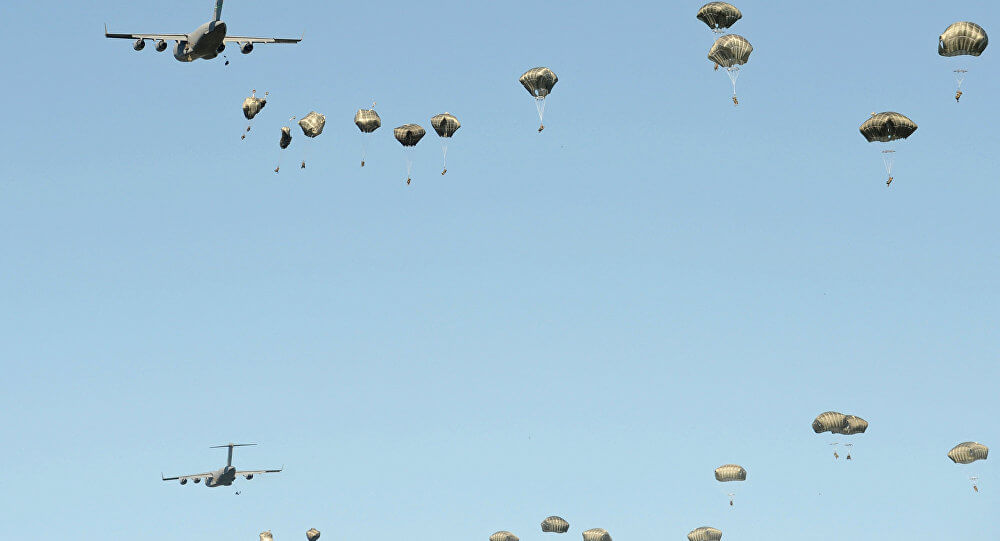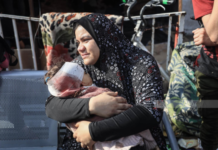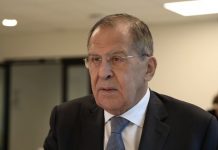By Ulrich Rippert
8 May 2017
On Thursday, German Defence Minister Ursula Von der Leyen apologized to army generals after having mildly criticised top officials for turning a blind eye to the operation of right-wing extremists in its ranks. The incident demonstrates the growing power of the country’s general staff amid the resurgence of German militarism.
More information has come to light in recent days about the arrested right-wing extremist Lieutenant Franco A., who, enjoying the protection of sections of the German military command, planned attacks on government representatives, left-wing activists, and Jewish and Muslim organisations.
Last weekend, Von der Leyen attempted to downplay the affair while mildly criticising the actions of the Bundeswehr (German army). She spoke of the army leadership having an “attitude problem.” Among the troops there was a “wrongly understood esprit de corps,” which among other things resulted in mistakes not being pursued correctly. “They look the other way. This is how it goes until an incident occurs. And that isn’t acceptable,” she told the ZDF programme “Berlin Direkt.”
These remarks unleashed a wave of protest from the military. The chairman of the German Army Association (DBWV), Lieutenant André Wüstner, said the minister’s behaviour was “unbelievable.” Nobody in the army could “verify” her assertions and branding of the army’s senior leadership personnel. It was unacceptable “how a minister is now, so to say, leaving the tribune and making judgements about the force.”
Retired Sergeant Major Gerhard Stärk, also a leading member of the DBWV, denounced Von der Leyen for sending “precisely the wrong signal by [accusing] the army of having leadership problems at various levels.” Such a blanket denunciation of the troops could not be accepted, he said. The case of Franco A. was an isolated incident. Everything ought not to be questioned because of one man. The Defence Minister’s criticisms were “very alienating and frustrating.” They were “horrendous statements.”
The denunciations of Von der Leyen were not limited to the army. The Social Democrats (SPD), Greens and Left Party attacked the minister. SPD chair Martin Schulz accused her of lacking awareness of her responsibilities. SPD defence expert Rainer Arnold called upon her to apologise to the soldiers. Former deputy leader of the SPD youth organisation Lars Klingbeil accused Von der Leyen of “betraying hundreds of thousands of soldiers.” Green Party defence expert Tobias Lindner stated, “The army can’t do anything about the fact that as an army, it has a higher attraction for right-wing extremists.”
On Thursday, Von der Leyen invited around 100 generals and leading army personnel to a speech at the Defence Ministry. One might have expected her to have grilled the army leadership and demanded an explanation for how a right-wing terrorist conspiracy could develop in the army and who was responsible for it. But instead the army leadership demonstrated its power.
The minister began her remarks by kowtowing to the generals and delivered a formal apology for her criticism. She stated, “Irrespective of where these men and women serve or work, it is an essential service for our country. They deserve thanks and recognition for that. I wish I had made these statements over the weekend during the five-minute interview on right-wing extremism. I am sorry that I did not do so. I am disappointed about that.”
The right-wing press celebrated, with the Frankfurter Allgemeine Zeitung titling its report on the incident “Von der Leyen appeals for forgiveness from generals.”
Von der Leyen’s bowing before the generals contradicts the democratic principle of the subordination of the military to the civilian power as laid down in Germany’s Basic Law in order to overcome the deep opposition to rearmament and the creation of the German army. According to Article 65, the defence minister, and in the case of defending the country the chancellor, has the power to issue orders and command the armed forces. In addition, the army is a parliamentary army, only the Bundestag (German parliament), not the government, can decide on a military intervention.
It is now clear that the subordination of the military to political decisions only applied during the relatively peaceful post-war period. But the army had barely begun to participate in military interventions and prepare for conflict between the major powers when the military leadership insisted upon its untouchability and independence, which the government and political parties have obliged.
In mid-April, the military historian Sönke Neitzel directed an appeal to the German general staff to let its voice be heard, and intervene into foreign and domestic policy. In times of war, “the general staff, meaning those close to 200 top employees in the remuneration groups B 6 to B 10,” are simply better than the politicians.
Less than four weeks later, this call has become a reality. Confronted with a neo-Nazi conspiracy, which possibly reaches into the highest echelons of the army, the generals reject all civilian control, attack their political superiors, and the civilian officials acquiesce to their demands.
Such relations last existed in Germany during the Weimar Republic, when the general staff formed a state within the state and the army served as a breeding ground for right-wing terrorist groups which murdered socialists, pacifists and even a government minister, Walther Rathenau, with impunity, contributing significantly to the rise of the Nazis.
The two leading First World War generals were directly involved in the undermining of the Weimar Republic: General Ludendorff supported the Kapp Putsch in 1920 and three years later launched a revolt alongside Hitler in Munich. General Paul von Hindenburg became president in 1925 and appointed Hitler as chancellor in January 1933.
This sinister tradition is once again being revived with the return of German militarism.
Von der Leyen did her best to cover up this history. Referring to Wehrmacht memorabilia found at the barracks living quarters where Franco A. served, she stated to the generals that Hitler’s Wehrmacht was “not the provider of tradition” for the army. “This is nothing new. That is self-evident for the army. In the Tradition Directive of 1982 it is unmistakably stated: ‘An extra-legal regime like the Third Reich cannot be the basis of tradition’.”
This is a transparent lie. We noted in a previous article that on its founding on 12 November, 1955, the army was still called the new Wehrmacht. All 44 generals and admirals appointed prior to 1957 came from Hitler’s Wehrmacht, overwhelmingly from the army’s general staff. In 1959, there were 12,360 Wehrmacht officers out of a total of 14,900 professional soldiers in the officer corps. Three hundred came from leading bodies of the SS.
According to a study published by military historian Wolfram Wette in 2011, “[T]his continuity of personnel [posed] a severe challenge for the internal life of the army.” In the army’s officer corps, the tendency persisted for a long time “to orient to the pre-1945 traditions.”
According to a report in Friday’s Süddeutsche Zeitung, seven army barracks continue to be named after major Wehrmacht figures, two of which, in Augustdorf, North Rhein-Westphalia and Dornstadt, Baden-Württemberg, after “Field Marshall Erwin Rommel,” and one in Münster, Lower Saxony, after Hindenburg.
At the initiative of Goebbels’ propaganda ministry, Rommel became a war hero in the Third Reich and was presented as Hitler’s most famous general. Since he broke with Hitler over military questions at the very end of the war and was driven to commit suicide, his legacy continued untarnished in the post-war period and the Rommel cult persisted.
The case of Franco A. and its consequences demonstrate that the return of Germany to militarism and imperialist policies does not only carry the danger of new wars abroad, but also of a return to military rule and dictatorship at home.











